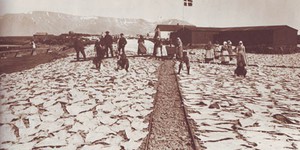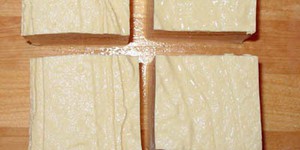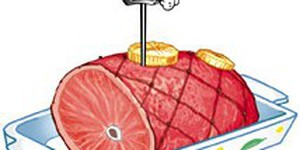Cooking & Food Science Science Projects (80 results)
Who doesn't love food? It's fun to make, it's fun to eat, it's fun to ...study? That's right! There is a lot of science that goes into the everyday foods that you love. Explore questions such as how baking ingredients work, how and why certain ingredients mix well together, and why people's tastes differ.
|
Select a resource
Sort by
|
When you think of successful inventions from the 1900's that have dramatically changed how people live, what comes to mind? The car? Radio? TV? The computer? What about the microwave oven? You might not remember a time when microwave ovens were not a standard part of most kitchens, but your parents or grandparents probably do. They can remember when heating leftovers took a good 30 minutes in a traditional oven. Or thawing a food from the freezer meant leaving it in the refrigerator overnight.…
Read more
Featured
Have you heard that garlic powder is supposed to inhibit the growth of bacteria? Which do you think would make a better disinfectant: a solution of garlic powder or a solution of bleach? This project shows you a straightforward way to compare the effectiveness of different disinfectants (or other antimicrobial agents), by measuring zones of inhibition on a culture plate.
Read more
Peanut butter is a popular ingredient in sandwiches, cookies, and many other common foods. In this cooking and food science fair project, you will roast peanuts in the oven at 350 degrees for 20, 30, and 40 minutes to produce variable levels of color and flavor. Roasting not only adds complex flavors to the peanuts, but it also destroys enzymes that produce off-flavors.
Each lot of roasted peanuts will be used to make a batch of peanut butter. You will evaluate each batch of peanut butter for…
Read more
Caramelization is the name of the cooking process that occurs as sugar is heated and the molecules begin to break apart. But what happens to the sugar as it breaks apart? And what do the physical changes mean for the flavor of the sugar? Using the Internet or cookbooks, read up on the chemistry of caramelization, then head to the kitchen with an adult to caramelize your own batch of sugar. With an adult's help, dissolve 1 1/3 cups of sugar in 2/3 cup of water. Heat the mixture in a pan over…
Read more
It's the bottom of the ninth, and you've spent a great afternoon at the ball game with a hotdog, a soda, and an ice cream in hand, but I'll bet you're not thinking about how many crops went into those classic baseball snacks. Sure, the bun contains wheat, but did you know that the hotdog might contain wheat, too? And soybeans may have been used to give that ice cream its perfectly smooth texture, while corn was likely used to sweeten the entire meal! Crops can be changed and added to processed…
Read more
Have you ever bitten into a slice of bread only to find that it no longer seems fresh? Instead, it has the firm, undesirable texture that comes about when the bread is going stale. Chemically, what happens during the staling process? Can it be reversed (at least temporarily)? Do some background research to answer these questions and then apply those answers to one (or more) of the following experiments to find the optimal state to keep your bread fresh.
Experiment 1: What Temperature Keeps…
Read more
What is cooking? Cooking is applying heat to food in order to help make it taste good. But the decision to cook your food doesn't end there. Do you want to cook it at a low temperature for a long time or do you want to apply high heat and cook or sear it right away? You might think that a pot is just something in which to cook your food, but it is also a cooking tool. Pots and pans are made from different kinds of materials, such as aluminum, stainless steel, iron, and ceramics. Each of these…
Read more
Spicy fried tofu. It's a delicious and savory main dish at many Asian restaurants. Stab a golden-brown piece, bite into it, and the juice inside rushes out, filling your mouth with rich flavors. Continue eating and you find the texture is very chewy and meat-like. Did you ever wonder how those white blocks of tofu you see in grocery stores are transformed into the chewy little sponges packed with flavorful juices you see in Asian restaurants? Try this cooking and food science fair project to…
Read more
When you open a can of green beans, have you ever wondered why the beans are not mushy, or more like a puree? Canning requires boiling the beans for a long period of time to kill bacteria, so why don't the beans fall apart into small pieces? Some fruits and vegetables—like cherries, apples, potatoes, sweet potatoes, beets, carrots, beans, cauliflower, and tomatoes—have the ability to undergo hardening, or firming of their plant tissues. A special enzyme, called pectin methyl…
Read more
"What? My food needs some standing time? How can food stand? I don't see any legs on those baked potatoes!" Whether you're using a traditional oven or a microwave, standing time is an important concept in cooking or baking. When you remove a food from an oven or a microwave, the food retains heat and continues to cook for several minutes after it has been removed from the heat source. This process of the food continuing to cook, using the retained heat in the food itself, is called carryover…
Read more
Brrrr, freezing cold! It's the worst nightmare of any fresh fruit or vegetable! If the produce in your kitchen had legs, they would run in a panic every time the freezer door opens. Why? Well, freezing temperatures are not kind to fresh produce. Freezing kills the plant tissues and alters them on both a chemical and physical level. Chemically, the enzymes in the produce become more concentrated and do not work normally, so that discoloration, off-flavors, vitamin breakdown, and toughness may…
Read more
|
Explore Our Science Videos
Separating Iron Filings from Sand
Squishy Circuits Introduction
Light-Tracking Robot: BlueBot Project #2









